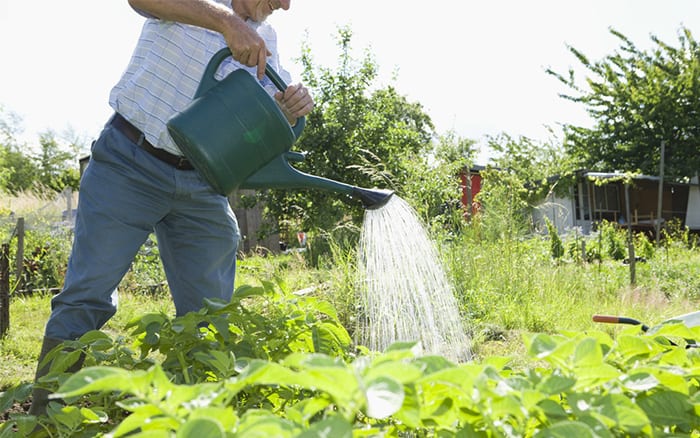We all love summer. This is the time you can enjoy the fruits of your gardening graft earlier in the year. But you’d be surprised how quickly soil can dry out on a warm day.
Making sure your garden is well watered will help plants put down deep roots and produce the best fruit, veg and flowers. Here are my top tips for keeping your garden fresh and healthy.
1 Morning glory
Water in the morning or at night, not in the high heat of the day which will evaporate the water before it reaches the root. Water droplets on leaves also act as a magnifying glass with the sun’s rays to scorch the plant.
2 Keep watch
Look out for signs of dryness in your plants. Soft-leaved plants are the first to suffer from a lack of hydration. The tip of the plant will bend, and then the leaves will wilt and feel crisp and dry to touch. But most plants are hardy and can be saved with a thorough watering.
3 Care for containers
Keep an eye on plants in containers, which don’t have a deep soil base. Most will need watering every day in summer. When you plant them, leave a 5cm gap between the soil and the lip of the container, or it will overflow when you try and water it.
4 Hanging baskets
Water hanging baskets every day. You can add hydration slices or crystals, but check moisture levels by pushing your fingers a few centimetres into the soil. If it feels dry, you need to water it. Immerse the basket in a bucket of water and leave until the air bubbles stop appearing. If they keep drying out, move them to a shady spot.
5 Break the soil
Soil can develop a hard crust if it gets too dry, meaning that water will just run off the surface. Push a broom handle a few inches into the soil to create reservoirs around plants before you water to make sure it soaks in and gets to the roots.
6 Soak away
Give plants a thorough soaking – water for at least 20 seconds. Little and often doesn’t allow water to soak deep into the soil, which is important because it encourages the plant to send down deeper roots.
7 Reuse and recycle
Reuse as much water as possible – install a water butt and recycle the water from the kid’s paddling pool on your lawn and flower beds. Just don’t tip it out – stagnant water will drown roots and could cause moss.
8 Use bottles
Keep containers and veg crops watered with recycled plastic bottles. Cut the bottom off and punch or drill holes in the lid. Half-bury the bottle in the soil near the plant roots, taking care not to damage them. Fill with water and it will gradually soak into the soil right where the roots need it.
9 Set to shower
Set your hosepipe nozzle to give a wide, gentle spray or use the shower attachment if you have one. Fast, narrow jets can blast soil and damage the plant. You should also keep the rose on your watering can for the same reasons.

10 Install irrigation
If your hosepipe gets a hole in it, tie off the end, punch more holes along the length and lay it on the soil around plants like an irrigation system. Keep plants watered while you’re on holiday by connecting it up to a timer.


Please can you tell me when to trim my lavender, it’s v leggy
Hi Diane, you need to cut it back by two thirds towards the end of August. You can cut back into bare wood, it should re-shoot. This gives it time to harden off new growth before winter comes.